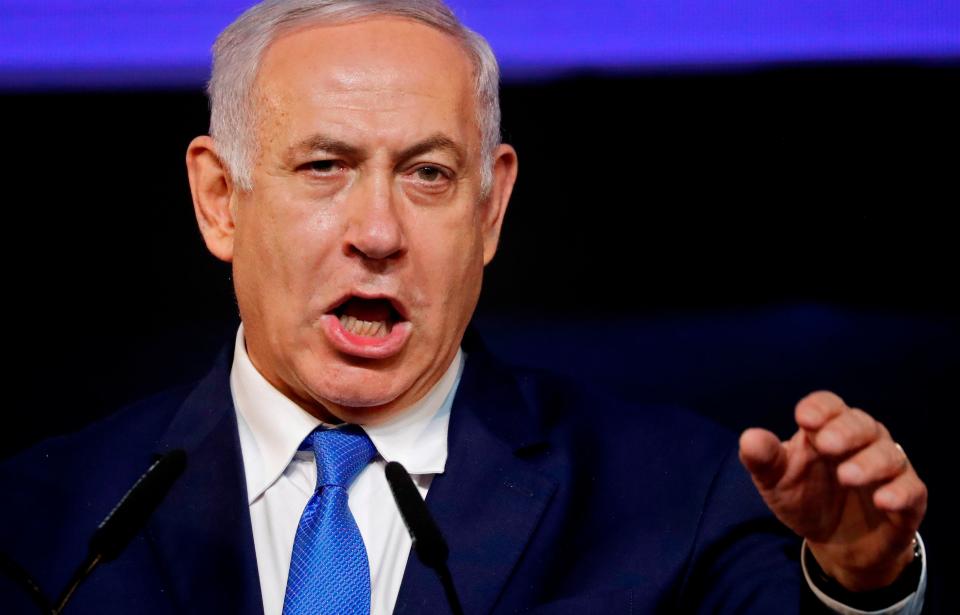Trump's son-in-law and adviser Jared Kushner meets with Israeli leader amid political chaos
Senior Trump administration officials, including the president's son-in-law Jared Kushner, met with Israeli Prime Minister Benjamin Netanyahu Thursday even as Israel faced an unprecedented political stalemate.
Netanyahu failed to form a new governing coalition on Wednesday, a stunning setback that will trigger a second election just seven weeks after the Israeli leader's Likud party appeared poised to command a majority in parliament.
Kushner, a senior adviser to President Donald Trump, arrived in Jerusalem amid the political chaos to pitch part of his Middle East peace plan, which now seems imperiled by the developments in Israel. The Trump administration has been banking on Netanyahu's staunch support to help bolster the yet-to-be-released plan, which Trump has touted as the "deal of the century."
But the Israeli leader's own future now is in doubt after he was unable to resolve a dispute between Likud's two potential coalition partners.
Trump and Netanyahu:: How two leaders reap political rewards from their cozy relationship
Israel's national assembly, the Knesset, voted to dissolve itself on Wednesday after it became clear that Netanyahu would be unable to bridge the gap between a secular ultranationalist party and ultra-Orthodox factions. Netanyahu is reportedly the first Israeli prime minister who has failed to form a governing coalition after an election, and voters will now have to go back to the polls on Sept. 17.
Amid the uncertainty, Kushner and Nethanyahu pressed ahead with their planned meeting. They were joined by other Trump administration officials, including Jason Greenblatt, the president's special representative for Israel-Palestinian negotiations. They're touring the region in an effort to recruit participants for an economic workshop in Bahrain next month that they've touted as the first step in the peace proposal.
"How's everything?" Kusher asked Netanyahu, according to an account in the Jerusalem Post.
Netanyahu insisted the political setback would not impact his negotiations with the Trump administration on a broad range of issues.
“Even though we had a little event last night, it is not going to stop us,” Netanyahu reportedly told reporters. “We are going to continue working together."
He said Kushner's visit "reaffirms that the alliance with the United States of America has never been stronger, and is going to get stronger.”
Trump has formed a deep alliance with Netanyahu, making a series of controversial pro-Israel policy decisions that have alienated Palestinians. Even before the latest developments, Kushner's peace proposal faced deep skepticism from the Arab world and fierce opposition from Palestinian leaders.
Now, experts said Kushner may not even ever release the plan, let alone make a real push for its acceptance. He has already delayed its unveiling multiple times.
"The political plan will never see the light of day," Tamara Cofman Wittes, a Middle East expert at the Brookings Institute, a Washington think tank, predicted in a tweet Wednesday.
A White House spokesman did not respond to questions about the fate of Kushner's peace proposal. But State Department spokeswoman Morgan Orgatus said she did not expect the Bahrain economic meeting to be delayed.
"We are not anticipating any changes," Orgatus told reporters at a State Department briefing Thursday.
But there's no doubt that Netanyahu will be distracted by the new election. In the April contest, his conservative Likud party won about the same number of parliamentary seats as his main challenger, Benny Gantz, a centrist former military chief.
But because of Netanyahu's alliance with other conservative factions, Israel's president, Reuven Rivlin, gave Netanyahu the first chance to form a governing coalition, with a deadline of midnight on Wednesday.

The immediate cause of Netanyahu's failure was a dispute between Avigdor Lieberman, who leads the small, secular Yisrael Beitenu faction, and the ultra-Orthodox Israeli factions, over new legislation that would alter who is eligible for Israel's military draft. Lieberman does not support exempting ultra-Orthodox men from military service.
Without Lieberman’s five parliamentary seats, Netanyahu has no parliamentary majority.
But the underlying issue is Netanyahu’s legal troubles. He faces a likely indictment on corruption charges in the coming months, and he has pressed his coalition partners to pass legislation that would grant him immunity from prosecution.
Opposition parties strongly oppose granting Netanyahu immunity, meaning he had no alternatives to Lieberman's party as he tried to form his coalition.
Trump weighed in on Netanyahu's behalf earlier this week with a tweet that critics said amounted to interference in another country's political affairs.
"Hoping things will work out with Israel's coalition formation and Bibi and I can continue to make the alliance between America and Israel stronger than ever," Trump tweeted on Monday. "A lot more to do!"
Hoping things will work out with Israel's coalition formation and Bibi and I can continue to make the alliance between America and Israel stronger than ever. A lot more to do!
— Donald J. Trump (@realDonaldTrump) May 27, 2019
Trump has made a series of controversial pro-Israel policy decisions, in what often seemed like an effort to boost Netanyahu's political prospects. And on Monday, Netanyahu seized on Trump's message as he tried to break the impasse.
But it was not enough and Israeli voters will now head back to the polls in a few months.
Contributing: Associated Press
This article originally appeared on USA TODAY: Trump's son-in-law and adviser Jared Kushner meets with Israeli leader amid political chaos

